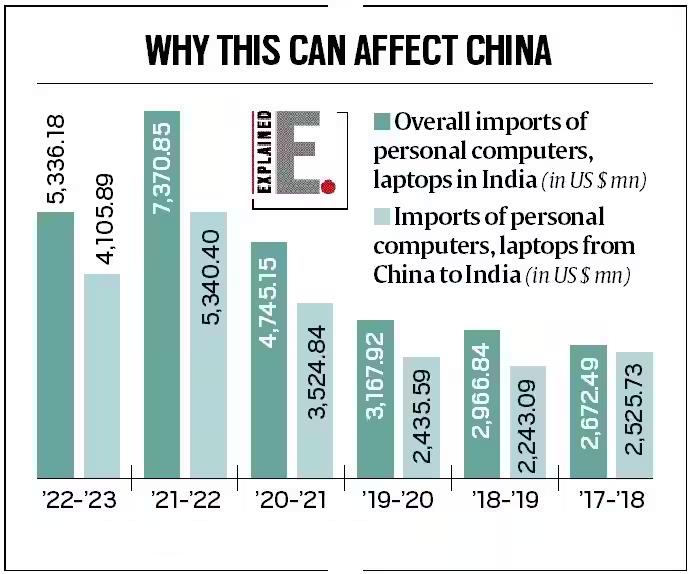Governance
India Implements Import Restrictions on Laptops, Computers, and Their Components
- 08 Aug 2023
- 5 min read
For Prelims: Harmonised System of Nomenclature, Directorate General of Foreign Trade, production-linked incentive (PLI) scheme for IT hardware
For Mains: Initiatives for self-reliance in India's technology sector, production-linked incentive (PLI) scheme
Why in News?
Recently, India's Directorate General of Foreign Trade (DGFT) has announced that from November 1, 2023, it will restrict the import of laptops, computers, and their components , focusing on items under Harmonised System of Nomenclature (HSN) Code 8471. Restriction shall not be applicable to imports under baggage rules.
Note: Data processing machines are classified under HSN code 8471.
What are the Reasons for Imposing Import Restrictions on Electronic Devices?
- These restrictions aim to boost domestic manufacturing, reduce reliance on foreign imports, particularly imports from China, and enhance self-reliance in India's technology sector.
- It aligns with government efforts to strengthen domestic production through the revitalized production-linked incentive (PLI) scheme for IT hardware.
- The restrictions aim to prevent the entry of electronic hardware with potential security vulnerabilities that could compromise sensitive personal and enterprise data.
- By restricting imports, the government aims to create a conducive environment for indigenous manufacturers to expand their global footprint.
How will this Restriction affect the Market and Consumers?
- The import restrictions on laptops and related devices may lead to disruptions in the supply chain, potentially affecting the availability of certain laptop models in the market.
- The policy will likely create a supply crunch in the short term, as importers will have to apply for licenses and wait for approvals. This could lead to higher prices and lower availability of laptops, tablets, personal computers, and servers in the market.
- Domestic manufacturers might benefit from the restrictions, as consumers might turn to locally produced laptops if imports become limited.
- The restrictions could incentivize the development of domestic laptop manufacturing capabilities, eventually leading to more advanced and competitive products.
- The policy will also affect the existing players in the laptop market, such as Dell, HP, Lenovo, Acer, Asus, and Apple, who have been importing most of their products from China, Vietnam, Taiwan, and other countries. They will have to either shift their production to India or source from local manufacturers who meet the quality standards.
- The policy will also create opportunities for new entrants and local manufacturers, who can leverage the PLI scheme and offer competitive products at affordable prices.
What is the Harmonised System of Nomenclature?
- The HSN is a system that assigns a unique code to every product that is traded internationally.
- The HSN code is used by customs authorities around the world to identify and assess tariffs on imported goods.
- It is also used by traders and exporters to declare their goods and comply with the rules of origin.
- The HSN code was developed by the World Customs Organization (WCO) in 1988 and is updated every five years.
Directorate General of Foreign Trade (DGFT):
- DGFT is a government body under the Ministry of Commerce and Industry that implements the country’s foreign trade policy.
- DGFT was established in 1991 as a successor to the Chief Controller of Imports & Exports (CCI&E).
- DGFT is headed by the Director General of Foreign Trade at the headquarters in New Delhi and regional offices across the country.
- DGFT regulates and promotes foreign trade through various schemes and measures, such as issuing licences, authorisations, certificates, incentives, etc.
- DGFT also provides guidance and assistance to exporters and importers, and coordinates with other ministries, departments, agencies, and stakeholders on trade-related issues.





